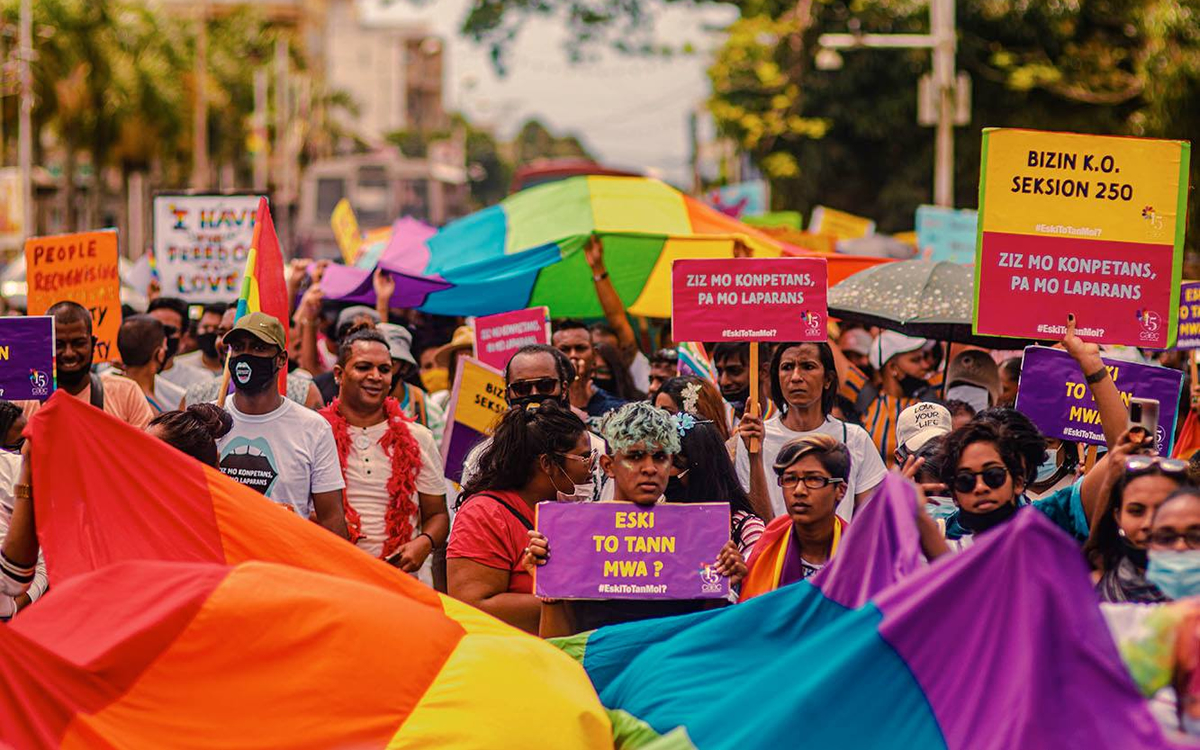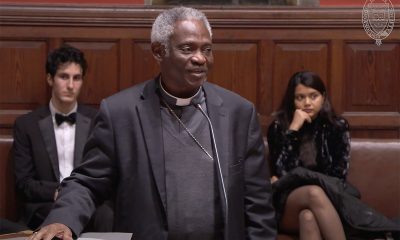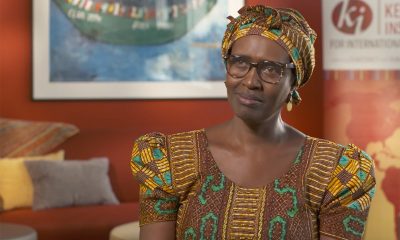Africa
Mauritius activists await ruling on sodomy law
Consensual same-sex sexual relations remain criminalized in country

Section 250 of Mauritius’ Criminal Code criminalizes sodomy with up to five years in prison. That may soon change after four young LGBTQ people challenged the law in the country’s Supreme Court.
The four plaintiffs who come from Hindu, Christian and Muslim backgrounds and are members of the Young Queer Alliance, a Mauritian LGBTQ rights group, brought their case in 2019. Three of them are the first public officers to come out as gay, while the fourth plaintiff is an artist.
The Young Queer Alliance in a statement notes two of the plaintiffs have been in a committed relationship for seven years. They and the other two plaintiffs argue Section 250(1) does not have a place in a modern and democratic Mauritius.
“2SLGBTQIA+ people should benefit from the same protection afforded to other citizens such as protection from discrimination and should enjoy the same freedom of expression and right to privacy as them,” says the Young Queer Alliance. “Section 250 is contrary to the values of democracy and treats 2SLGBTQIA+ people as second-class citizens. There is no justifiable reason why section 250(1) should be maintained in our criminal code when it concerns two consenting adults.”
The Young Queer Alliance notes the plaintiffs have requested the Supreme Court to declare that “sexual orientation forms part of and is implied in the definition of sex as enacted under Sections 3, 3 (a) and 16 of the Constitution of Mauritius, a declaration that Section 250 of the Criminal Code Act is unconstitutional and alternatively, a declaration that Section 250 of the Criminal Code does not apply to consensual acts of sodomy performed by consensual adults.”
Jean Daniel Wong of Collectif Arc-en-Ciel, an NGO that focuses on human rights issues in Mauritius, told the Washington Blade the case is a historic moment for the country.
“This was a truly historic moment for our nation, which has always placed equality and non-discrimination at the heart of the very fabric of our society,” said Wong. “Section 250 stands in stark contrast to the ideals of our Constitution. 2SLGBTQIA+ rights are human rights. Who we are and who we love should never be reasons for discrimination or abuse. It is time for our country to provide us with the same legal protections and equality before the law as all citizens of Mauritius.”
The Supreme Court last considered the case on June 1.
If it repeals Section 250(1); Mauritius will join South Africa, Angola, Botswana and other African countries that have decriminalized consensual same-sex sexual relations.
Daniel Itai is the Washington Blade’s Africa Correspondent.
Africa
American Evangelical churches masquerade as connoisseurs of African family values
Anti-LGBTQ Family Watch International, partners held conference in Nairobi last month

On Friday, May 16, 2025, Family Watch International and its partners gathered in Nairobi, Kenya, for a week-long conference themed “the Pan-African Conference on Family Values.” Family Watch International is a U.S. Christian conservative organization led by the infamous Sharon Slater. This anti-choice and anti-LGBTQ+ organization lobbies in the United Nations and countries around the world to push their anti-rights and anti-gender agenda.
This wasn’t the first conference convened on East African soil; one such was held in Uganda, from May 9-11, 2025, where Family Watch International was also a part. East Africa seems to be the hub for conservative U.S. evangelists, and one wonders why. The conference is a series of conferences focusing on what they call traditional African family values. Again, one wonders what gives an American organization the authority to speak to Africans about African Family values. After the May gathering in Nairobi, the delegates released a press statement introducing and claiming to be adopting what they labelled “The Nairobi Declaration on Family Values.”
Funded misinformation
This article was thus born to review and address, particularly, the “African family” ideas purported in the declaration. The first inquiry is, who is funding the conference? This conference is heavily funded and guided by the ultraconservative far-right evangelical movements from America and Europe. The African hosts, the Kenya Christian Professionals Forum and the Kenyan Ministry of Labor and Social Protection and actors are merely tokens in this scheme aimed at taking over Africa by erasing its actual values and redefining them from a Western and Eurocentric religious lens. The colonial missionaries historically employed this very familiar move. Another blatant untruth in their declaration is the claim that they represent governments, civil society, academia, religious bodies, and “allied international partners.” There has been no evidence to prove this claim, except for the participants who are known conservatives, infamous for their hate and anti-rights rhetoric from countries such as Uganda, Kenya, and South Africa. This piece of misinformation and disinformation is one of the strategies they employ to make it seem like most, if not all, African governments and masses approve of their unscientific absurdity.
African Family values owned by foreign entities
According to the declaration, their engagements aim to “Promoting and Protecting Family Values in Challenging Times,” advocate for and protect the “natural family.” It is rather peculiar that American and European organizations would lead a conversation about African family values. These are modern imperialists; they intend to cement their Western-centric idea of a family. Their family structure comprises a mother, a father, and children, while the African family is beyond that. Although nuclear family units do exist within African society, it is the more nuanced family structures consisting of “children, parents, grandparents, uncles, aunts, brothers, and sisters who may have their own children and other immediate relatives” that dominate the African family traditions. Often in rural areas, children are communally raised by their grandmothers, aunts, and siblings, as the parents go to the cities for economic opportunities and serve more as financial support for their young. It is therefore naïve for these modern imperialists to falsely claim a singular and rigid definition of family, especially as it concerns African people. Failure to acknowledge the diversities and complexities that exist within African family structures is both delusional and a clear indication of how there is nothing Pan-African about the conference itself.
Nothing Pan-African about it
Furthermore, how does a Pan-African family conference discuss African family values without African traditional leaders, elders, and spiritual leaders? Their exclusion of these figures demonstrates that they uphold the colonial and missionary legacy. It remains the view of the majority of Africans that those in traditional roles are the true custodians of the African culture, language, traditions, customs, and values, and these individuals clearly misalign with these modern imperialists’ agenda and mandate, thus illegitimizing claims of Pan-Africanism and protecting African family and values. The cognitive dissonance is evident in African actors who adopt those imported religious beliefs and regard them as superior to true African spirituality and culture, making these individuals modern imperialists.
Misleading the people
The intentional misuse of the term “Pan-African” not only misleads but can also entice those who believe what the term has historically meant, while in actual fact, the ideals they are spreading are far from Pan-Africanism. Meanwhile, African human rights organizations and those who can legitimately claim Pan-Africanism are concerned about colonial laws and the reform and eradication of colonial legacies. The modern imperialists, on the other hand, are reinforcing the colonial legacy by using confusing and dividing language aimed at causing moral panic among African communities.
Erasure
Activists in Kenya who have been following and monitoring the work of Family Watch International in Africa have argued that their agenda poses a grave threat to erasing Africa’s rich diversity of families. What the conference deems un-African are the same characteristics that the colonial missionaries historically labelled undesirable when they indoctrinated African societies in Christianity and its values, when Africans were made to believe that their own spiritualities are demonic.
The term “values” becomes redundant when it is solely tied to Christianity and disregards true African realities. They are causing confusion among African societies through the use of desirable and triggering language such as “Pan-Africa” and “African values.” When people are divided and busy fighting each other, important issues will fall through the cracks, go unnoticed, and there will be a lack of accountability. These modern imperialists use tactics to distract the African nation with these ideas that historically have never been a problem within African societies; meanwhile, the looting of the African land continues, and so does the exploitation of its minerals and resources. This article is part of the Southern Africa Litigation Center’s campaign around addressing hate speech, misinformation and disinformation. #StopTheHate #TruthMatters
Daniel Digashu is a consultant at the Southern Africa Litigation Center.
South Sudan
The forgotten struggle: LGBTQ refugees and asylum seekers in South Sudan
June 20 is World Refugee Day

As the world prepares to mark World Refugee Day on June 20, discussions will echo across continents about war, displacement, and humanitarian assistance. But there is one story that is often left out — a story of a people who are doubly displaced, constantly under threat, and too often excluded from protection programs. We are the LGBTQ+ refugees and asylum seekers living in South Sudan, particularly in Gorom Refugee Settlement, and our daily struggle for survival continues in silence, far from global headlines and political promises.
We are refugees who fled our homes in Uganda, Rwanda, Burundi, the Democratic Republic of Congo, Ethiopia, and Sudan — countries where being lesbian, gay, bisexual, transgender, or queer means being hunted by the state, persecuted by society, and disowned by our own families. Many of us first found temporary safety in Kenya, only to be forced to flee once more as hostility and violence found us even there. We ended up in South Sudan, believing it might be safer. But we were wrong.
What we have experienced is a relentless cycle of flight and fear. We are tired of running, tired of hiding, and tired of being treated like we do not exist.
Fleeing persecution, only to face more
The reasons we fled our home countries are all rooted in systemic hate: we were accused of witchcraft, imprisoned for who we love, subjected to forced “conversions” or exorcisms, and physically assaulted by family members and neighbors alike.
Lesbian women in Uganda and Rwanda were forced into marriages with men, some even raped by their own relatives to “cure” them. Gay men in Burundi and Congo were arrested, tortured, and publicly humiliated. Transgender individuals in Ethiopia were stripped of all dignity, mocked in the streets, denied medical treatment, and in some cases beaten to the point of unconsciousness. Bisexual youth were disowned and kicked out of their homes. And queer children — or children simply perceived as different — were molested, assaulted, or abandoned.
We thought Kenya might provide refuge. For a while, it did. But soon, even the refugee camps in Kenya became unsafe. Attacks on LGBTQ+ individuals increased. Some of us were sexually assaulted inside UNHCR facilities. Local authorities turned a blind eye. The Kenyan government ultimately declared it would no longer support resettlement for LGBTQ+ asylum seekers. And so, once again, we fled.
This time, we crossed into South Sudan. And again, we hoped for safety. But at Gorom Refugee Settlement, we found yet another kind of danger — one that is quieter, colder, and just as cruel.
What life looks like in Gorom: constant threat and no protection
At Gorom, we face daily verbal abuse, physical violence, economic isolation, and state indifference. LGBTQ+ refugees are attacked by fellow refugees and members of the local host community. In some cases, we are targeted by our own block leaders, who refuse to distribute food or health services if they suspect we are queer. In clinics, trans women are mocked, told they are “possessed,” and denied even basic medical care. Those of us living with HIV face layers of stigma — our sexual orientation is blamed for our condition, and we are often left without access to lifesaving medication.
Safe housing for LGBTQ+ refugees does not exist in Gorom. Couples are forced to pretend to be siblings or risk being separated — or worse. One gay couple was recently threatened by men in their block who accused them of “bringing demons.” They have not slept in the same shelter since.
Lesbian sisters, sharing a small shelter to survive, told us:
“We sleep in turns at night — one keeps watch while the other rests. We’ve been threatened with rape three times. Our block leader told us to leave or act straight.”
Children of LGBTQ+ parents, or those who are gender non-conforming, are bullied at school or excluded entirely. Some are even denied meals at community kitchens — punished simply for who their parents are.
For many queer women, survival sex work becomes the only option. There is no employment, no support, and no safety. This leads to alarming rates of sexual assault and HIV infection. Yet when they seek help, they are either ignored or blamed.
And while mental health crises are rising, there is no trauma support designed for queer refugees. Many of us have attempted suicide. Some have succeeded.
We have evidence, but no urgency
In early 2024, a SOGIESC (sexual orientation, gender identity and expression, and sex characteristics) assessment was conducted by peer human rights monitors inside Gorom. It documented the situation clearly and thoroughly.
• Many transgender individuals had been physically assaulted in the span of just three months
• Lesbians received death threats or were targeted with “corrective rape”
• LGBTQ+ persons were denied medical services
• Attempted suicide
These are not just statistics. These are names, lives, and stories. And yet, most of the reports were never acted upon. Bureaucratic delays, unclear processes, and shifting responsibilities have turned urgent threats into forgotten files. Each time we cry out for help, we are told to wait. But in our world, waiting can be fatal.
Acknowledging those who have helped; and those who must do more
We extend sincere appreciation to the Commission for Refugee Affairs of South Sudan. Since December 2023, LGBTQ+ refugees were allowed to remain in Gorom with a degree of tolerance. In a country where same-sex relationships are widely condemned, this space mattered. But the relief was short-lived.
We now face an eviction order, issued for June 20, ironically, on World Refugee Day. The government has declared that all LGBTQ+ individuals must leave the settlement. No safe relocation site has been offered. No plan for protection has been shared. Once again, we are being pushed out — not for something we did, but for who we are.
We also recognize the continued engagement of UNHCR South Sudan and some officials working on the ground. Their intent is clear. They listen to our voices, acknowledge our pain, and try to act within their mandates. But the pace of intervention is too slow. In many cases, the process of documentation, assessment, and relocation takes months. By the time help arrives, it is too late.
We also commend the advocacy of Rainbow Railroad, which has raised awareness globally about the plight of LGBTQ+ refugees. Their work has saved lives. But we need them to be faster, more connected to those of us already in danger, and more responsive to grassroots alerts from inside the camps.
If coordination, funding, and trust between grassroots advocates and major institutions could improve, we would not be burying so many of our community members. We would not have to keep writing these cries for help.
Real voices, real pain
“I was beaten because my jeans were ‘too tight.’ They said I looked like a woman. I am a woman — trans — but they made me feel like an animal,” says Daniella, 24.
“We put our names on the protection list. My partner was attacked at the water point the next day. Nobody came to help us,” says Joseph, 31.
“I am HIV-positive. The clinic nurse laughed and said I got it through sin. I haven’t gone back since. I just stay in bed now,” says Amina, 28, a lesbian mother of two.
These are not rare stories. These are everyday truths for queer refugees in South Sudan. And still, we are expected to stay silent and grateful.
Our call to the world
We are not asking for special treatment. We are demanding equal protection under the same humanitarian principles that others receive. We ask that:
• UNHCR and all partner organizations prioritize LGBTQIA+ safety in refugee camps, not as an afterthought but as a core responsibility
• Safe shelters and protection units be created for queer refugees facing internal violence
• LGBTQ+ refugees be consulted in decisions about policies, services, and resettlement programs that affect us directly
• Emergency medical and mental health services be inclusive of queer identities and trauma
• Pathways to resettlement for LGBTQ+ individuals be accelerated, especially for those in crisis.
Let this World Refugee Day mean something
To be queer in a refugee camp is to constantly fight for your life. It means being forgotten by both your country of origin and your supposed place of refuge. It means sleeping in fear, eating in shame, and living without dignity. It means being told that safety exists, but not for you.
We are tired of running. Tired of hiding. Tired of begging for our humanity to be acknowledged. But we are still here. We still believe that the world can listen. And we still believe that justice is possible — if only someone chooses to act.
This World Refugee Day, remember that we are not just refugees. We are LGBTQ+. We are survivors. And we deserve to live.
Abraham Junior lives in the Gorom Refugee Settlement in South Sudan.
Kenya
Queer Kenyans, Ugandans celebrate Pride month
Pan-African Conference on Family Values took place in Nairobi in May

As queer people around the world celebrate Pride month, their Kenyan and Ugandan counterparts are also marking it with a strong message of defiance and resistance.
Their agitation for “dignity, safety, and liberation” in homophobic environments follows last month’s second Pan-African Conference on Family Values in Nairobi, whose delegates were concerned about the push to normalize so-called LGBTQ practices on the continent and resolved to resist.
The Initiative for Equality and Non Discrimination, a Kenyan LGBTQ rights organization, for instance cites Pride’s founding spirit of protest to resist the attempt to “erase, silence and oppress” queer people.
“In a world that tries to diminish our existence, choosing joy becomes a radical act. Queer joy is not just a celebration, it is resistance. It is healing. It is a bold declaration; we are here, we are whole, and we deserve to thrive,” INEND states.
It affirms that queer people have space for rage, resistance, softness, and joy as they honor the roots of Pride packed with a variety of activities for the group throughout the month.
“We demand inclusion, we bask for visibility and we dance through the fire. This, too, is revolution,” INEND says.
During the Pan-African Conference on Family Values meeting, which delegates from national governments, anti-LGBTQ lobby groups, academic and religious institutions, and international partners attended, Kenyan National Assembly Speaker Moses Wetang’ula affirmed the country’s position on marriage between a man and a woman as the constitution states. Wetang’ula advocates for laws that protect the “traditional family” and cultural values against what he described as Western imports.
“I urge our legislators that they should shield the good provisions of our constitution on family from ideological redefinitions of marriage seeking to recognize outlawed same-sex relationships,” Wetang’ula said.
He also asked lawmakers to enact laws to prohibit comprehensive sexuality education in schools and only permit a science-based curriculum that is appropriate to the age, development level, and cultural background of school children without normalizing same-sex sexual acts and relationships.
“In modern times, across all nations, there have emerged two forces: one fighting for, and the other pursuing ideologies, positions, and acts that are against the traditional family,” Wetang’ula said.
The delegates during the conference, which sparked criticism from Kenyan queer groups committed to resist the imposition of LGBTQ rights and other so-called external values under the pretense of development aid, international agreements, or donor partnerships that conflict with national laws and cultural integrity. They also committed to establishing, strengthening, and coordinating “pro-family” advocacy platforms and multi-sector coalitions at national, regional, and continental levels to engage with policymakers, legislators, and public education players.
This pledge was in response to the delegates’ concerns over external manipulation of national legislative processes through covert or overt efforts to influence or bypass national parliaments in adopting judicial decisions that redefine family, life, and gender. They were also concerned over the global push to normalize gender fluidity and “non-biological” sexual identities in law, education, and healthcare, contrary to established biological, African culture, and religious norms.
The delegates asked the African governments, parliaments, the African Union, and regional economic blocs to urgently undertake legislative reviews and reforms to ensure all national laws align with constitutional protections for the family, life, and parental rights. The Initiative for Equality and Non Discrimination, however, argue that describing queerness as un-African is a lie and a tool of imperialism used as a weapon to justify violence, exclusion and erasure, which should be rejected as it was enacted by colonial powers.
Kenya’s queer community has nevertheless lined up a month’s worth of Pride events in Nairobi, the country, and across the country. Some of the locations are not publicly disclosed because of security reasons.
The events calendar that Galck, a group of 16 LGBTQ rights organizations, released includes entertainment and socializing every Friday evening in various places for queer party lovers. The celebrations also include queer community networking events to empower each other, meet-ups in safe places for soft, acoustic jam sessions and reflection, queer community days where the group gather to connect and celebrate queer lives.
The calendar also invites queer people to participate in an open conversation with Galck, a trivia and karaoke event with the National Gay and Lesbian Human Rights Commission, a supportive healing circle termed ‘Healing out Loud’ for distressed queer people, and a queer community potluck for the group to enjoy food, fun and connection.
Other Pride events include queer love edition for singles, an art exhibition that includes rainbow- themed painting, a healing-centred therapy workshop termed “Chosen Family, Chosen Self,” a literary forum for bookworms to celebrate queer African literature, and movie night for film lovers.
The Cosmopolitan Affirming Community, a Nairobi-based church for queer people, has organized Gospel Sunday. Trek Tribe Kenya, an outdoor activity organizer, is also organizing activities that include climbing Mount Kenya, Africa’s second-highest mountain, hiking the gorges of Hell’s Gate National Park, and enjoying a “Pastel in the Park” wellness treat.
“Respect the spaces you attend as they are safe, affirming environments, and take care of oneself and each other during Pride fun fare celebration,” Galck urges.
‘Pride is not just parades or celebrations’
Their queer counterparts in Uganda are also having an eventful Pride month, despite persistent challenges.
“Pride is not just parades or celebrations. It is solidarity for many who cannot celebrate or march. It means refusing to be erased and choosing to simply be who you are,” said Sexual Minorities Uganda, which LGBTQ activist Frank Mugisha leads.
-

 U.S. Supreme Court3 days ago
U.S. Supreme Court3 days agoSupreme Court upholds ACA rule that makes PrEP, other preventative care free
-

 U.S. Supreme Court3 days ago
U.S. Supreme Court3 days agoSupreme Court rules parents must have option to opt children out of LGBTQ-specific lessons
-

 National5 days ago
National5 days agoEvan Wolfson on the 10-year legacy of marriage equality
-

 Congress4 days ago
Congress4 days agoSenate parliamentarian orders removal of gender-affirming care ban from GOP reconciliation bill












